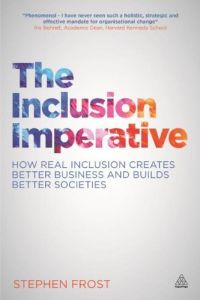Melden Sie sich bei getAbstract an, um die Zusammenfassung zu erhalten.

Melden Sie sich bei getAbstract an, um die Zusammenfassung zu erhalten.
Stephen Frost
The Inclusion Imperative
How Real Inclusion Creates Better Business and Builds Better Societies
Kogan Page, 2014
Was ist drin?
Is your organization diverse, inclusive – or diverse and inclusive?
Recommendation
Stephen Frost provides a brilliant, if somewhat long and repetitive, case for a new approach to diversity and inclusion (D&I). Drawing on his experience leading the Diversity and Inclusion team of the “London Organising Committee of the Olympic and Paralympic Games” (LOCOG), he implores you to stop forcing diversity upon your workplace. Stop creating a separate, expensive and often annoying parallel organizational process. Instead, weave diversity and inclusion into your business plan so it aligns with and supports your business objectives. Instead of compliance and policing quotas, use evidence to convince your colleagues that diversity and inclusion are the right values to carry out and the best course for your business. The 2012 London Olympics were the most diverse and inclusive in history; the congruence of those two factors is not a coincidence. getAbstract recommends this inside account of how the London Committee developed its proven, flexible methodology to any leader seeking concrete, immediate applicable ideas and tactics for diversity and inclusion.
Summary
About the Author
Diversity consultant and Harvard Kennedy School lecturer Stephen Frost is past head of Diversity and Inclusion for the London Olympic Games.



















Comment on this summary